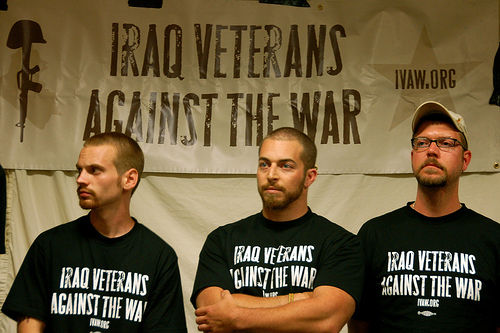
As a veteran of Operation Iraqi Freedom, and a veteran of sorts of the antiwar movement, I feel that the left as a whole has done a poor job of speaking to veterans. This is unfortunate considering they are an extremely important resource and could be great allies in our fight for democracy and freedom for the people of America and the world. We must find a way to communicate with them without parroting rhetoric that is frankly inapplicable to today’s military and today’s war.
When we protest war, do we protest the war itself, the warrior, or the people who truly started the war in the first place? Vets feel they are being protested as well as the war. How can we separate the war from the warrior? It’s like trying to dissociate a shoe from a shoemaker or an exterminator from their poison. Soldiering requires a high level of training and skill. It also requires a sense of honor, self-sacrifice, courage, duty and loyalty – noble values that we on the left hold in high esteem as we work for peace and justice. However, in our zeal for opposing war, we often have failed to recognize these positive traits in U.S. soldiers. We often generalize and dehumanize them.
However, we can all agree that most soldiers are certainly not psychotic killers who enjoy death and suffering. If this were the case, then why are the VA hospitals filling up with people horribly traumatized with PTSD, their humanity and consciousness scarred? For the rest of their lives, veterans will experience guilt, horror, terror, confusion and anger. And yet, these scars validate their humanity. Soldiers are good people who have gone through hell. By all accounts they should be considered victims, although their pride would never let them accept our pity.
So why do they fight unpopular wars? The reason is simple. Soldiers themselves correctly point out that they did not choose the war, therefore we cannot hold them responsible for the facts of the war. They have no control over where they go, who they fight, and when they return. They can literally do nothing about their lot, and, despite the screeching on the far left, it is delusional for us to believe that soldiers will commit mass disobedience against this or any war. In any case, such disobedience would lead to the military clamping down on civil rights and possibly cutting us off from the soldiers completely. We must face the fact that massive disobedience is simply not practical or possible in an all-volunteer military. Soldiers operate under too many rules and they have been trained too well for this to ever occur. In our rhetoric, we must therefore be sure to separate soldiers from the war.
But what do we tell a soldier who has just come back from Iraq – who has seen combat for three years, has had many friends killed for what feels like no reason, and comes home to a lukewarm welcome and a broken-down VA system that leaves them out in the cold? How do we reach them? How can we gain the trust of those who believe that we hate them because we dislike the war they fight? Who believe that we “hate America” because we dislike some of its leaders and major aspects of its economic structure?
How do we address soldiers experiencing alienation from the society they once belonged to? Their dissatisfaction can be fodder for right-wing extremist groups. Such groups are working to recruit these alienated and troubled soldiers and Marines and twist them into foot-soldiers of hate and death. Or they are tricking them into Quixotic crusades for unrealistic candidates like Ron Paul and his “libertarian” circus. This trend may have terrible consequences for the future of this country. We may be moving toward a similar situation as the one in post-World-War-I Germany when legions of disaffected German soldiers were recruited by fascist thugs to fight progressive reforms and help turn Germany into a fascist state. Today, the myriad “tea party” groups, whose anger at any kind of progressive reform is to some degree fueled by closeted racism, are feeding the feelings of victimhood already present in many soldiers.
To reach veterans, disaffected and otherwise, we must clearly communicate the nature of war, the Iraq War in particular, and their role in it without attacking their honor or dignity, or else we lose their ear. We must separate them from the war without lying to them or talking down to them.
We must explain the truth:
- – Soldiers fight and die in wars to secure natural resources and captive markets for capitalists to exploit.
- – Most wars fought over the last 200 years have had nothing to do with freedom or democracy.
- – As working-class Americans they share a common brotherhood with 90 percent of the world. They share a deeper brotherhood with the average Iraqi than almost nine-tenths of the U.S. Congress by this simple class measure – a Congress that sends young men and women to kill, fight and die so that they can secure profits for large multinational corporations and the “defense” industry.
We must do this without the conversation devolving into superficial liberalism or pacifism. It is not enough for them to think “killing is wrong” and leave it at that. This would be ignoring the bigger picture and doing them a great disservice. They must be told about the nature and origin of war and imperialism truthfully and scientifically so they can decide for themselves about war and why they feel so much doubt and alienation.
We must communicate that we do not hate America when we disagree with policies of its leaders and their marriage to big business. We must communicate the class roots of warfare and the veterans’ role in it. We must tell them that it is morally right to use their freedom of speech to talk about their experiences. We must convince them that we are fighting FOR them if not WITH them. Most of all, veterans need to hear that values of honor, self sacrifice, courage, duty, and loyalty – their values – are needed to fight for democracy and freedom here at home. We need them to help us build a better future for America, and to bring peace at last for the rest of the world.












Comments